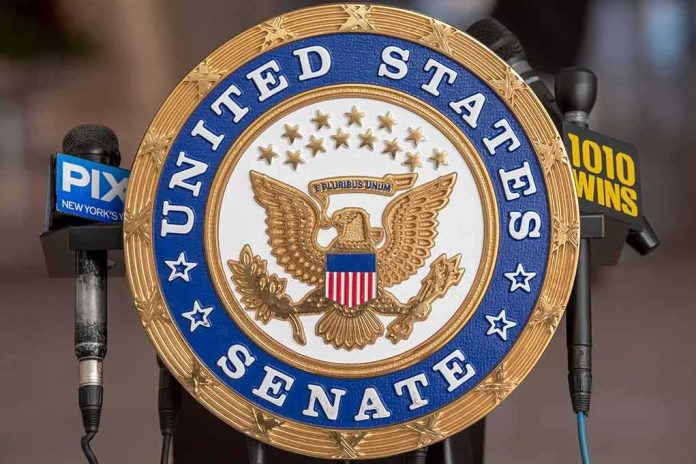
Pennsylvania Senator John Fetterman faces mounting pressure from his own party as Democratic leaders quietly orchestrate plans to potentially oust him over his increasingly independent positions that defy party orthodoxy.
Story Snapshot
- Democratic Party brass in Pennsylvania are quietly plotting against Fetterman due to his independent streak
- Fetterman was directly confronted about maintaining his Democratic identity while breaking from party lines
- The senator’s positions have created tension with traditional Democratic leadership expectations
- Party loyalty versus independent thinking has become a defining issue in Fetterman’s tenure
The Party Loyalty Ultimatum
John Fetterman received a blunt message Wednesday when confronted about his political allegiances: “You have to pick one side.” The Pennsylvania Democrat has increasingly frustrated party leadership with positions that stray from established Democratic talking points. His willingness to break ranks has transformed him from a reliable party vote into what some view as an unpredictable wildcard who threatens party unity and messaging discipline.
Behind-the-Scenes Plotting Emerges
Pennsylvania Democratic Party insiders have begun quiet discussions about potentially challenging Fetterman’s future within the organization. These conversations represent a significant escalation in tensions between the senator and party establishment figures who expected more predictable loyalty from their recently elected colleague. The plotting suggests deeper concerns about Fetterman’s long-term commitment to Democratic priorities and his willingness to publicly contradict party positions on key issues.
Party leaders face a delicate balancing act between maintaining unity and accommodating diverse viewpoints within their ranks. Fetterman’s independent streak forces them to confront fundamental questions about ideological flexibility versus institutional loyalty. His positions have created uncomfortable moments for Democrats trying to present a unified front on contentious issues while managing internal disagreements.
🇺🇸 SEN. FETTERMAN BREAKS RANKS: “I FOLLOW COUNTRY, THEN PARTY.”
John Fetterman just torched his own side on national TV – and smiled doing it.
At a NewsNation town hall, the Pennsylvania Democrat slammed his party’s shutdown brinkmanship:
“I follow country, then party.”
In… https://t.co/MsGB9CrLPT pic.twitter.com/0iMogHz2iM
— Mario Nawfal (@MarioNawfal) October 16, 2025
The Independent Streak That Sparked Controversy
Fetterman’s departure from party orthodoxy spans multiple policy areas where he has taken positions that align more closely with moderate or conservative viewpoints than traditional Democratic stances. His willingness to publicly disagree with party leadership has created friction within Democratic circles and raised questions about his long-term political trajectory. These positions have garnered attention from both supporters who appreciate his independence and critics who view his actions as disloyal.
The senator’s approach reflects a broader tension within American politics between rigid party discipline and individual conscience. His positions demonstrate that even within established party structures, elected officials sometimes prioritize personal convictions over institutional expectations. This dynamic creates challenges for party leadership seeking to maintain cohesive messaging while accommodating diverse perspectives from their membership.
Political Consequences and Future Implications
The confrontation over Fetterman’s party loyalty highlights fundamental questions about political identity in contemporary American politics. His situation illustrates the difficulties faced by politicians who attempt to maintain independence while operating within partisan structures that reward conformity and punish deviation. The pressure he faces demonstrates how party organizations respond when members challenge established boundaries and expectations.
Fetterman’s response to these pressures will likely influence how other politicians navigate similar tensions between party loyalty and independent thinking. His experience serves as a case study in the costs and benefits of political independence within established party systems. The outcome of this confrontation could set precedents for how parties handle dissenting voices and whether room exists for genuine ideological diversity within partisan organizations.
Sources:
John Fetterman’s Pathetic Reaction to Democratic Plot to Oust Him






